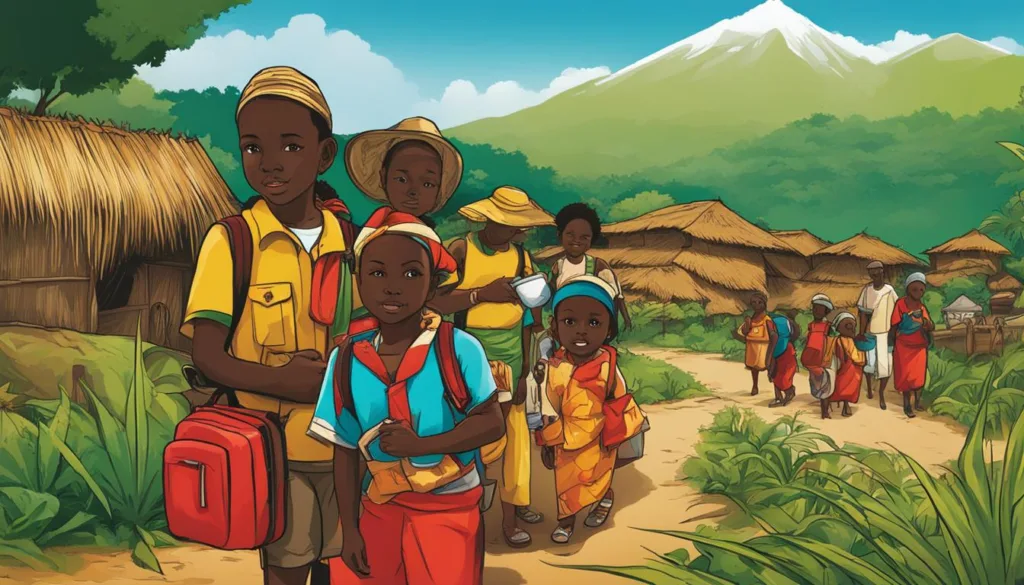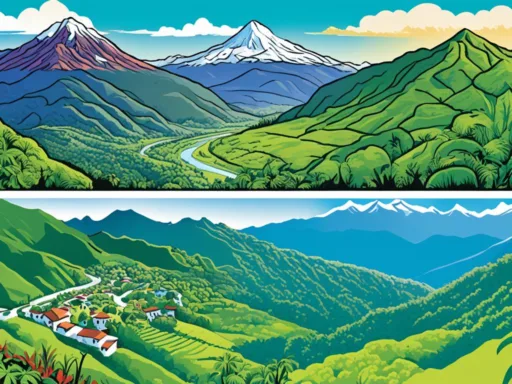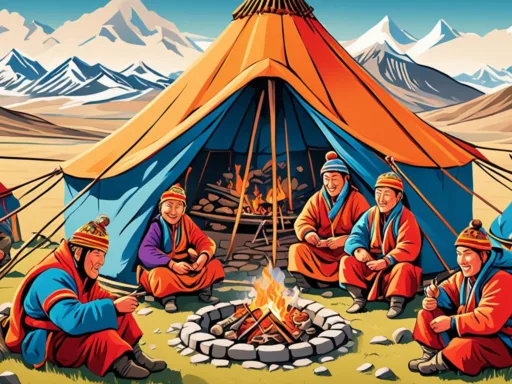Often lost amidst the grand narratives of African travel, Burundi beckons the curious and the adventurous. Nestled in the heart of Central Africa, this nation abounds with natural marvels and a warmth that resonates through its local festivities. But what really is the Best Time to Visit Burundi? Could the seasons play a hidden symphony that only the well-informed can hear? Join us as we uncover the secrets that define the Burundi travel seasons and identify the ideal time to visit Burundi, guided by an insightful Burundi weather guide.
Against a backdrop of recovery and resilience, seeking the perfect juncture to experience this country’s vibrancy means juggling the climatic and cultural calendar. From the breezy shores of Lake Tanganyika to the scenic highlands, planning your journey is less about avoiding the crowds and more about embracing Burundi’s soul in its most radiant timeframes. Let’s embark on a voyage of discovery to when the skies and the spirits of Burundi align for the ultimate escape.
Key Takeaways
- Understanding the best time for your Burundian adventure requires more than just a quick glance at the weather.
- The intertwining of Burundi’s climate and cultural events holds the key to planning a trip that goes beyond the ordinary.
- Seasonal nuances play a critical role in the enjoyment of this nation’s diverse landscapes and attractions.
- Strategically timing your travels can unlock the door to rare experiences and authentic interactions with the local heritage.
- Cognizance of the current political climate is equally vital as appreciating the country’s weather patterns when considering travel seasons in Burundi.
Understanding Burundi’s Climate
Visitors to Burundi are welcomed by a climate that’s as multifaceted as the country’s lush landscapes and vibrant culture. Influenced by factors such as altitude and the proximity to the Great Lakes, the Burundi climate offers travelers a range of environments to explore, from cool mountainous regions to warm valleys. Whether you’re planning to immerse yourself in the peak season in Burundi or trying to navigate the dry and wet seasons, understanding the local weather patterns is crucial for a comfortable and enriching travel experience.
The Influence of Altitude and the Great Lakes
Burundi’s altitude ranges significantly across the country, producing notable variations in climate. Places like the Congo-Nile watershed enjoy cooler temperatures thanks to their higher elevations. On the other hand, the Great Lakes region, including areas around Lake Tanganyika, tends to be warmer. This diversity means that travelers can find a climate tailored to their preferences at any given time of the year.
Navigating the Dry and Wet Seasons
When exploring Burundi, it’s essential to recognize the patterns of the dry and wet seasons in Burundi. With the rainy period extending from October to May and punctuated by a brief dry spell in January, preparing for the conditions you’ll face is key. Packing light rain gear could be as important as your sun hat and sunscreen.
Planning Around the Intertropical Convergence Zone
The Inter-tropical Convergence Zone (ITCZ) markedly impacts weather patterns throughout Burundi. This climatic phenomenon can bring about rapid changes in weather, making it a significant factor for travelers to consider. Staying informed about the ITCZ’s movements will help you plan your activities and travel itineraries, ensuring you get the most out of your visit during any season.
With these insights into Burundi’s climate, travelers can better plan their journey, ensuring that they visit during a time that aligns with their preferences, whether it’s peak season in Burundi or an off-the-beaten-path experience they seek.
Best Time to Visit Burundi
For those pondering when to visit Burundi, pinpointing the ideal travel time is pivotal to experience the country at its finest. Burundi’s climatic sweet spots, the top seasons in Burundi, are the dry periods stretching from June to September and the shorter spans of rain from October to November. These intervals herald a climate that’s both amiable and conducive to an array of outdoor activities.

Warm days and balmy evenings characterize these months, with mercury readings typically ranging from a comfortable 20 to 30 degrees Celsius. It’s a time when rainfall becomes a rare guest, allowing the country’s verdant landscapes to shine unobstructed by the rainy season’s downpours.
- National Parks: Venture into expanses like Kibira National Park during the dry season for unparalleled wildlife sightings.
- Warm Beach Getaways: The pristine shores of Lake Tanganyika are perfect for relaxation or swimming in the sun-kissed dry months.
- Festivals: Align your visit with cultural events like Burundi Music Festival or the International Film Festival to immerse in the local culture.
- Sporting Events: Athletes can join the annual Burundi Marathon, leveraging the dry weather for optimal performance.
The choices are endless, and whether you’re delving into the hustle of a city market, exploring the serene realms of rural Burundi, or engaging with the contagious rhythms at a music fest, you’re bound to discover the nation’s soul most vividly during these periods.
Ultimately, the best time for travelers to explore this enchanting African gem is when the tapestry of cultural offerings and climatic conditions interweave harmoniously, creating an unforgettable tapestry of experiences.
Cultural Festivities and the Ideal Time to Join
Delving into the heart of Burundi’s cultural heritage offers tourists a vivid palette of events that deeply enrich the travel experience. Sparked with color and tradition, the Burundi festivals are not just occasions but a gateway to understanding the nation’s enduring spirit of resilience and unity. Timing your visit to coincide with these cultural events Burundi hosts annually can significantly enhance your experience of this beautiful country.
Burundi’s Independence Day: A National Celebration
Noted as one of the most significant events in Burundi’s calendar, Independence Day Burundi on July 1st is a day of immense national pride. This day marks the country’s autonomy achieved in 1962 and is celebrated with parades, traditional dances, and jubilant public gatherings. Visitors are welcomed to partake in the festivities, which offer a unique glimpse into the rich history and identity of the nation.
Festivals and Events: When Culture Comes Alive
Burundi’s vibrant cultural scene is most vividly on display during its many festivals. These range from music, arts to film, each offering visitors a different facet of Burundi tourism timing. From the pulsating rhythms at the Burundi Jazz Festival to the cinematic treasures at the International Film Festival, these events showcase the country’s modern artistic expressions and invite global interactions.
Local Traditions and Regional Observances
Local cultural traditions across various regions reflect the diversity of Burundi’s heritage. These periodic traditional observances, often rooted in religion or historical significance, provide travelers with an intimate look at the strong communal ties of the Burundian people. Observing or even participating in these local customs can be a profoundly moving experience.
| Event | Date | Location | Experience |
|---|---|---|---|
| Independence Day Celebrations | July 1st | Nationwide | Parades, Cultural Performances |
| Burundi Jazz Festival | TBA | Varies | Music Performances, Workshops |
| International Film Festival | TBA | Varies | Film Screenings, Discussions |
| Local Communal Gatherings | Varied | Regional | Cultural Ceremonies, Feasting |
What to Know Before You Go
Embarking on an adventure to Burundi offers a chance to explore one of Africa’s hidden gems. However, before setting off, off-peak travel to Burundi can be a prudent choice to avoid the crowds and enjoy a more authentic experience. To ensure a safe and enjoyable journey, here’s some Burundi tourism advice to take into consideration.

Securing entry into Burundi involves some pre-planning. Travelers from the U.S. should apply for a visa at least a month in advance, taking into account any lead times for processing. When it comes to health risks in Burundi, keeping abreast of vaccinations is vital. Yellow fever vaccination is mandatory, and precautions against Zika and malaria, such as prophylactic medication and mosquito repellents, are strongly recommended.
Stay informed. Consult the latest security advisories regularly, as the political landscape can be fluid.
Traveling within Burundi is often a cash affair. It’s important to carry an adequate amount of cash since credit card acceptance is not widespread, especially outside urban areas. For health and safety, consuming bottled or boiled water is paramount to avoid waterborne illnesses.
Awareness and respect for local customs and sensibilities, such as dressing modestly, will go a long way in showing respect for Burundi’s conservative culture. Moreover, even a basic grasp of French or Kirundi will enrich interactions with locals, opening doors to a more immersive experience. Here are some handy tips summarized:
- Apply for your visa well ahead of your travel date.
- Stay updated on vaccinations and health advisories.
- Always carry cash for transactions.
- Respect local customs and dress modestly.
- Learn some basic French or Kirundi phrases.
Below is a table that provides a snapshot of key travel considerations:
| Preparation Step | Description | Recommendation |
|---|---|---|
| Visa Application | Necessary for entry into Burundi | Apply at least one month in advance |
| Health Precautions | Vaccines and prevention against diseases | Consult a travel clinic for the latest advice |
| Money Matters | Currency usage in Burundi | Bring sufficient cash for your trip |
| Water Safety | Avoid tap water | Opt for bottled or boiled water |
| Cultural Considerations | Adherence to local customs | Dress conservatively; learn some local language |
With these precautions and preparations in hand, you are well on your way to a memorable journey in Burundi. Safe travels!
Travel Costs and Budgeting for Your Trip
Embarking on a journey to Burundi requires a well-structured budget, which can greatly vary depending on your travel choices. Understanding the typical costs from flights to amenities is crucial for a hassle-free adventure. Let’s delve into the details of Burundi travel costs, accommodation in Burundi, and strategies for budgeting for your Burundi trip.

Flights from the United States to Burundi are generally the most significant expenditure, with prices swinging based on the season. A comprehensive table below highlights typical travel expenses, focusing on variations in accommodation rates, daily food, and transportation costs to aid in your financial planning.
| Expense Category | Cost (USD) | Tips for Budgeting |
|---|---|---|
| Airfare | $700 – $1,200 | Book in advance and look for deals during off-peak times. |
| Accommodation (per night) | $10 – $150+ | Guesthouses for tight budgets; hotels for more comfort. |
| Meals (per day) | $2 – $20 | Street food for savings, restaurants for dining experiences. |
| Transportation (per day) | Varies | Use local taxis and agree on the fare beforehand. |
| Entertainment (entrance fees) | $5 – $20 | National parks and attractions carry an affordable entry fee. |
| Beverages (water, local beer) | Around $1 | Refreshing and economical, stick to bottled water for safety. |
| Daily Budget Estimate | $30 – $150+ | Align your spending with your desired level of comfort. |
By utilizing this table, you can gauge the daily costs and adapt your budget accordingly. Whether opting for economical guesthouses or splurging on luxury accommodations, Burundi offers suitable options for every type of traveler. Always remember to include a little extra for unexpected expenses or special indulgences.
Finally, consider the exchange rates and payment preferences in Burundi; carrying local currency can often be advantageous for small purchases. With mindful budgeting, you can savor the allure of Burundi without financial frets overshadowing your experience.
Conclusion
As we distill our exploration of Burundi into key takeaways, the harmonious concurrence of favorable weather and vibrant festivals emerge as the prime time for a visit. The dry seasons are not only advantageous for their radiant skies but also play host to a tapestry of cultural festivities, enriching the experience of every traveler. Yet, the true essence of Burundi goes beyond the bounds of any calendar, offering indelible moments all year round through its rich heritage, natural splendor, and welcoming spirit.
Summing Up the Best Times for Weather and Festivals
For those seeking to soak in Burundi’s warmth both meteorologically and culturally, the ideal window spans from June to September, with an additional peak during December to February. This is when the nation’s terrain, from lush highlands to tranquil lakeshores, is most accessible and its people are immersed in jubilation, from musical beats to traditional ceremonies. **Burundi tourism planning** around these times increases the chances of clear skies and openings to partake in the array of festivals, elevating the **memorable travel Burundi** experience.
Practical Tips for a Memorable Burundi Experience
To ensure your venture is as smooth as it is unforgettable, a prudent approach to health, safety, and cultural etiquette is vital. A respectful traveler is mindful of local practices, comes prepared with necessary vaccinations, and stays informed with the latest travel advisories. Embracing these practicalities primes you for a journey filled with rich discoveries, safe adventures, and unique interactions that form the mosaic of a fulfilling **Burundi experience all seasons**.
Making the Most of Your Visit Regardless of Season
No matter when your compass points toward this heart of Africa, the way you plan and engage with Burundi can turn any period into the best time for immersion. With each season holding its unique allure, from verdant monsoon landscapes to sun-kissed hills, your openness to adventure and appetite for cultural wealth will define the richness of your sojourn. In Burundi, time is art – it paints diverse strokes on your canvas of memories, each as vibrant as the cultural heritage that permeates this land.






